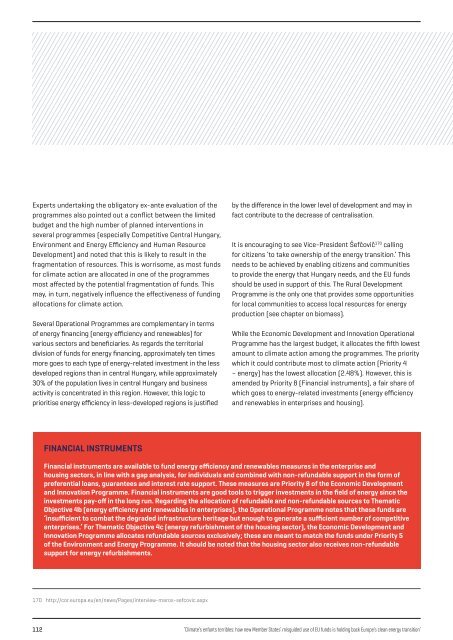ENFANTS TERRIBLES
enfants-terribles
enfants-terribles
Create successful ePaper yourself
Turn your PDF publications into a flip-book with our unique Google optimized e-Paper software.
Experts undertaking the obligatory ex-ante evaluation of the<br />
programmes also pointed out a conflict between the limited<br />
budget and the high number of planned interventions in<br />
several programmes (especially Competitive Central Hungary,<br />
Environment and Energy Efficiency and Human Resource<br />
Development) and noted that this is likely to result in the<br />
fragmentation of resources. This is worrisome, as most funds<br />
for climate action are allocated in one of the programmes<br />
most affected by the potential fragmentation of funds. This<br />
may, in turn, negatively influence the effectiveness of funding<br />
allocations for climate action.<br />
Several Operational Programmes are complementary in terms<br />
of energy financing (energy efficiency and renewables) for<br />
various sectors and beneficiaries. As regards the territorial<br />
division of funds for energy financing, approximately ten times<br />
more goes to each type of energy-related investment in the less<br />
developed regions than in central Hungary, while approximately<br />
30% of the population lives in central Hungary and business<br />
activity is concentrated in this region. However, this logic to<br />
prioritise energy efficiency in less-developed regions is justified<br />
by the difference in the lower level of development and may in<br />
fact contribute to the decrease of centralisation.<br />
It is encouraging to see Vice-President Šefčovič 170 calling<br />
for citizens ‘to take ownership of the energy transition.’ This<br />
needs to be achieved by enabling citizens and communities<br />
to provide the energy that Hungary needs, and the EU funds<br />
should be used in support of this. The Rural Development<br />
Programme is the only one that provides some opportunities<br />
for local communities to access local resources for energy<br />
production (see chapter on biomass).<br />
While the Economic Development and Innovation Operational<br />
Programme has the largest budget, it allocates the fifth lowest<br />
amount to climate action among the programmes. The priority<br />
which it could contribute most to climate action (Priority 4<br />
– energy) has the lowest allocation (2.48%). However, this is<br />
amended by Priority 8 (Financial instruments), a fair share of<br />
which goes to energy-related investments (energy efficiency<br />
and renewables in enterprises and housing).<br />
FINANCIAL INSTRUMENTS<br />
Financial instruments are available to fund energy efficiency and renewables measures in the enterprise and<br />
housing sectors, in line with a gap analysis, for individuals and combined with non-refundable support in the form of<br />
preferential loans, guarantees and interest rate support. These measures are Priority 8 of the Economic Development<br />
and Innovation Programme. Financial instruments are good tools to trigger investments in the field of energy since the<br />
investments pay-off in the long run. Regarding the allocation of refundable and non-refundable sources to Thematic<br />
Objective 4b (energy efficiency and renewables in enterprises), the Operational Programme notes that these funds are<br />
‘insufficient to combat the degraded infrastructure heritage but enough to generate a sufficient number of competitive<br />
enterprises.’ For Thematic Objective 4c (energy refurbishment of the housing sector), the Economic Development and<br />
Innovation Programme allocates refundable sources exclusively; these are meant to match the funds under Priority 5<br />
of the Environment and Energy Programme. It should be noted that the housing sector also receives non-refundable<br />
support for energy refurbishments.<br />
170 http://cor.europa.eu/en/news/Pages/interview-maros-sefcovic.aspx<br />
112<br />
‘Climate’s enfants terribles: how new Member States’ misguided use of EU funds is holding back Europe’s clean energy transition’


